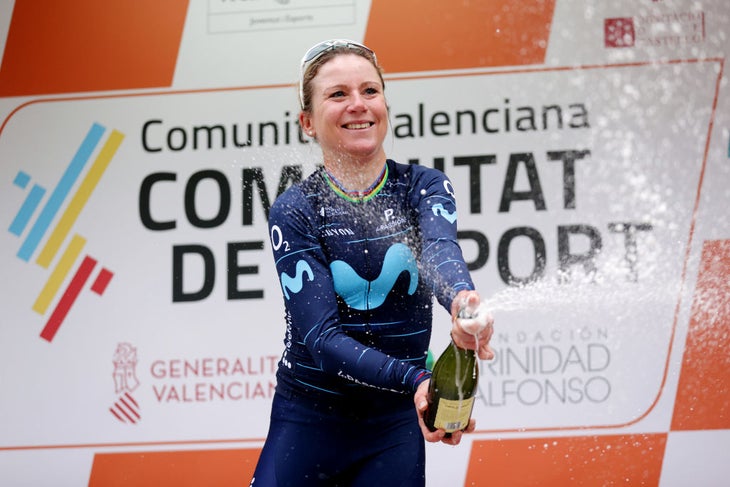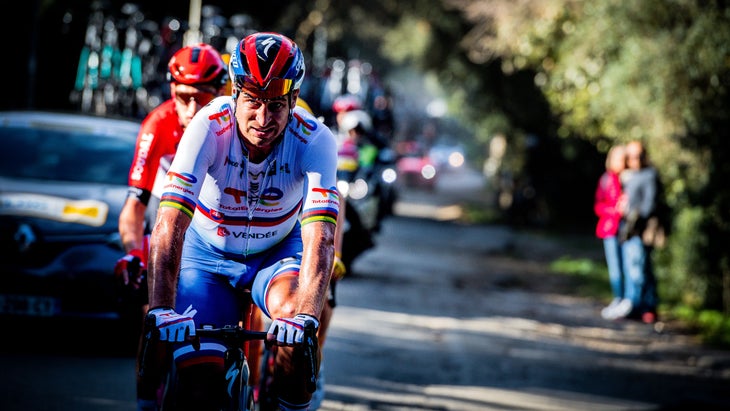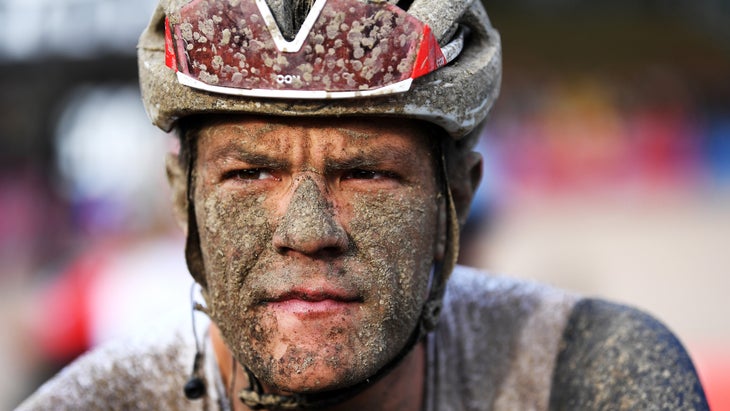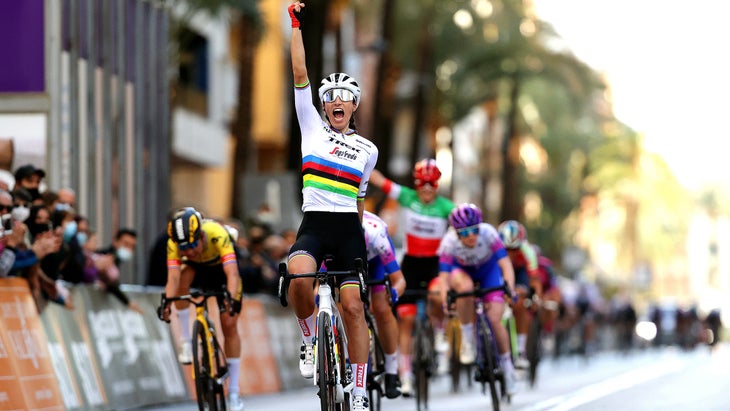Like bears crawling out of winter hibernation, the peloton’s cobble-eaters and berg-bashers roar back into the frame for Belgium’s famous “opening weekend” famished and frenzied for racing.
Riders like Annemiek van Vleuten and Peter Sagan are already lighting things up, but nearly everyone else is keeping their powder dry. For many of the classics specialists, the “opening weekend” is simply the starting point of their spring season campaign.
Belgium’s “opening weekend” delivers two delicious servings Saturday and Sunday across both the men’s and women’s calendar.
Omloop Het Nieuwsblad and Kuurne-Brussel-Kuurne on the men’s side, and Omloop and Omloop van het Hageland on the women’s side. Sharp hills, sectors of pavé, unpredictable weather, wind, cold, and untested and uneven legs all but assure exciting racing.
Also read:
- Strong lineup for women’s Omloop
- Classics specialists ramp up for Omloop debut
- From Omloop to Roubaix, the 2022 classics season will be unlike any other
All four races will be telling in many ways and, for the keen eye, can provide clues and hints about who will be flying in March and April, and who might not be.
The opening of the Belgian calendar is always one of the most anticipated weekends of the year, and helps the peloton shift gears from “early season” mode to the “this *#@! is real” mentality.
Do winners at these first major races see a guarantee of success in the monuments and other major one-days? Not always, and in fact, almost never.
There’s never a direct line from the winner’s podium at Omloop to hoisting a chunk of cobble in the Paris-Roubaix velodrome several weeks later.
What the “opening weekend” does do — besides serving up some of the best racing after a long winter — is give teams, riders, and fans a precursor of bigger things to come.
Here are some major points to watch this weekend while you’re sipping your Stella Artois and munching on some frites and mayo:
Who’s flying, and trying not to read too much into it

One of the most telling points of the action in any of the four “opening weekend” races is to watch for who’s flying.
Everyone inside the peloton will have their collective radar up and the rivals will be watching each other’s legs. A winner doesn’t always foretell classics dominance, but the sharp eyes in the peloton and inside the team cars will very quickly be able to discern who has the zip in their legs and who doesn’t.
There are a few things the rivals are looking for. How fast a rider can close a gap, or who gets gapped out when they shouldn’t. Which teams are organized, and which seem to be a jumbled mess. Who covers a move and how searing the accelerations are. All that will be filed away into the data banks going into the big races in March and April.
It’s not just the results sheet that counts in these early races.
It’s the race intel that can prove decisive when a rider must decide in an instant on whether or not to follow a wheel when it really counts a few weeks down the road.
Who’s not flying, and why that’s not that big of a deal (yet)

The “opening weekend” is also an important litmus test for everyone inside the bunch.
Though neither race on the men’s side is “monument” distance, that is to say north of 250km and six hours of racing, both races present the first serious and sustained physical effort of the season. The women’s races, too, deliver the first hard-hitting action of the season.
Annemiek Van Vleuten, Elisa Balsamo, Emma Norsgaard, Lotte Kopecky line up at women’s Omloop Het Nieuwsblad
After a long wait, the women’s season is ramping up with the third race of the year and the opening cobbled classics hit.https://t.co/QOs2FfZtI8
— VeloNews (@velonews) February 23, 2022
Within that context, trainers and coaches will be closely watching power monitors, heart rates, and pre- and post-race recovery with a sharp eye.
With today’s finely tuned training programs, coaches will know if a rider needs to taper off the intensity of their efforts, or decidedly ramp them up in the coming few weeks to hit a targeted peak that comes in or about “Holy Week,” even though Paris-Roubaix is coming a week later this year due to French national elections.
Several top classics favorites that VeloNews queried during the past few weeks all said they are playing catch up with their form. There are lingering fears about COVID-19, both in terms of avoiding it or recovering from an infection.
That could produce uneven racing on the men’s side, and perhaps deliver a surprise winner or at least signal someone who is packing winning legs right from the gun.
For the women, this weekend is really the start line of a nearly two-month sprint across a series of important one-day racing that opens the WorldTour in Strade Bianche and runs all the way through April.
Winning now doesn’t always guarantee classics success

A big win this weekend is great for the palmarès, morale, and perhaps even the paycheck for riders on a contract season.
Yet victory in either Omloop or KBK doesn’t guarantee success in the monument season.
In fact, no male rider has ever won the Omloop and Kuurne-Brussels-Kuurne on the same weekend.
Of the past 10 winners at Omloop, only Greg Van Avermaet won a monument in the same season he hoisted his Omloop trophy, going on to win Paris-Roubaix later that spring. Equally, none of the past 10 winners at Kuurne have won a monument in the same season after kicking to victory.
A few big names on the men’s side are steering clear of the opening weekend, including Kuurne defending champion Mads Pedersen. Both want to be “fresher” for the heart of the classics calendar, especially with Roubaix kicking off a week later than normal.
It’s a little different on the women’s side, where the peloton is dominated by all-rounders and not quite as specialized as the men’s peloton. The Dutch have bossed the women’s Omloop for the past half-decade, and this weekend will provide the first hints on which teams and riders are up to the challenge.
Of course, many winners of any of these races go on to have big successes in the other major one-days.
It’s simply that winning big in the “opening weekend” is far from a guarantee of a major victory in the heart of the cobblestones classics in the same calendar year.
… but sometimes it does

That’s not to underestimate the importance of “opening weekend” among the elite classics specialists.
Van Avermart carried “big mo” out of his 2017 victory, and won Harelbeke, Gent-Wevelgem and Paris-Roubaix, with second at Tour of Flanders and Strade Bianche. Last year, Anna van der Breggen won at Omloop and was a tear all the way through the Giro d’Italia Donne.
This weekend’s races can often mark the start of a promising classics career, and there have been several up-and-coming riders over the years who’ve hit the winner’s podium relatively early in their respective careers.
Jasper Stuyven won Kuurne in 2016 to establish himself as a rising classics star, and went on to win Milano-Sanremo last year in dramatic fashion. Kasper Asgreen also ticked off Kuurne in 2020 as a harbinger of his breakout 2021 classics campaign.
Van der Breggen won Omloop in 2015, a victory that seemed to “change the chip” for the now-retired superstar, and kick-started her dominance for the second half of the decade in all the major one-days.
Who’ll you cheer for during Saturday’s races? 😉 Let us know in the comments! 👇 #OHN22 pic.twitter.com/inYTGP9hMJ
— OmloopHetNieuwsblad (@OmloopHNB) February 22, 2022
Omloop is also considered one of Belgium’s “Big Six,” and is among the most important one-day races on the men’s Flemish calendar. Kuurne is a step below, though still a major race, and the same goes for Omloop van het Hageland. Both of those races are typically more sprinter-friendly than the Omloops on Saturday.
A WorldTour event for the men but not the women, Omloop ranks up there alongside Dwars door Vlaanderen and Scheldeprijs in terms of prestige and is just a touch behind the E3 Saxo Classic/Harelbeke. Gent-Wevelgem is next level, and the Tour of Flanders is at hallowed “monument” status.
Any win this weekend is a major feather in anyone’s cap, and the prestige of both races cannot be underplayed.
A strong showing in either the men’s or women’s peloton sets the tone, bolsters the confidence, and heightens the expectations across an organization going into the important spring classics calendar.
Omloop is the big one to watch.
Every big name in the bunch wants and tries to add that to their trophy case.
